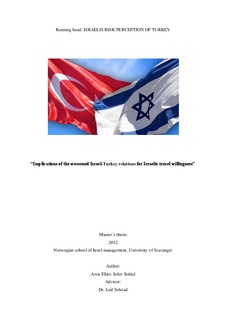| dc.contributor.author | Soldal, Aron Elliot Sofer | |
| dc.date.accessioned | 2012-09-28T14:54:54Z | |
| dc.date.available | 2012-09-28T14:54:54Z | |
| dc.date.issued | 2012-06 | |
| dc.identifier.uri | http://hdl.handle.net/11250/185163 | |
| dc.description | Master's thesis in International Hospitality Management | no_NO |
| dc.description.abstract | For many years Israel and Turkey had a thriving relationship which manifested itself through economic cooperation within several sectors. The Turkish tourism industry represented one of the largest beneficiaries of this cooperation as Israeli outbound tourism to Turkey exceeded half a million travelers at its summit. However because of a number of factors including the political direction of Turkey, the Mavi Marmara episode and critical statements by Turkey´s PM Erdogan towards Israel the countries´ bilateral bond has steadily loosened. Simultaneously tourism from Israel to Turkey decreased to less than a hundred thousand in 2011. These developments provide the contextual background for this research as it has considered the implications of the worsened bilateral bond between the nations for tourism. More specifically the research questions for this thesis were: “In what degree has the bilateral deterioration between Israel and Turkey negatively influenced Israelis´ willingness to travel to Turkey and increased their perception of risk in doing the same?” and “What factors have possibly restrained Israelis´ willingness to travel to Turkey?”. The second of these are considered as the main research question for this thesis as it has been investigated neither empirically nor anecdotally before. In order to give answers to this the researcher has applied a multi-method framework for the data collection which thus involved the use of both qualitative and quantitative data collection methods. The quantitative method was used as the researcher distributed a hundred questionnaires to Israeli citizens regarding risk perception and travel willingness in travelling to Turkey. Furthermore the qualitative method was used as the researcher conducted interviews with 10 individual Israelis, one Israeli travel agent and two tourism professors regarding the same issues. This last method has been prioritized as it is considered the best suited to answer the second research question. The findings from the research can be summarized as follows:
-The deterioration in relations between Israel and Turkey has decreased Israelis´ willingness to travel to Turkey
-The deterioration in relations between Israel and Turkey has led to increased risk perception of Turkey on the part of Israelis
-The unwillingness to travel to Turkey is mainly caused by risk perception, a desire to make a political manifestation against Turkey and a feeling of being unwelcomed in Turkey. | no_NO |
| dc.language.iso | eng | no_NO |
| dc.publisher | University of Stavanger, Norway | no_NO |
| dc.relation.ispartofseries | Masteroppgave/UIS-SV-NHS/2012; | |
| dc.subject | hotelladministrasjon | no_NO |
| dc.subject | reiselivsadministrasjon | no_NO |
| dc.subject | risk perception | no_NO |
| dc.subject | Israel-Turkey relations | no_NO |
| dc.title | Implications of the worsened Israel-Turkey relations on Israeli travel willingness | no_NO |
| dc.type | Master thesis | no_NO |
| dc.subject.nsi | VDP::Social science: 200::Economics: 210::Business: 213 | no_NO |
| dc.source.pagenumber | 126 | no_NO |
